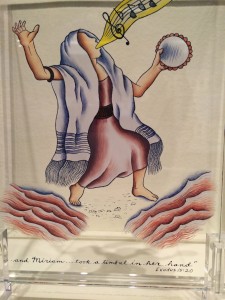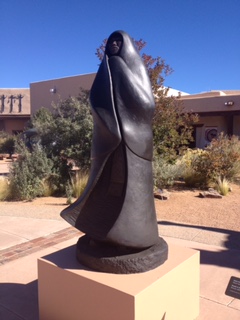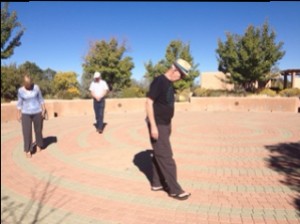 On my recent journey, I went nowhere without being reminded of the past–in the topography. in the architecture, in the celebration. A deep thread to my own roots was in the exhibit at the New Mexico Art Museum. Judy Chicago, a heroine of my younger adulthood, had an exhibit there, one part of which celebrated her own roots in the Exodus story of the deliverance from slavery, beginning with the journey through the Sea of Reeds. For me the centerpiece was her rendering of Miriam, breaking out in to song after successfully eluding the enemy and crossing on to dry land with the Power of the Holy One, leading and protecting. Miriam takes a timbrel and leads the women of her community to sing and dance their way into freedom. I heard Judy Chicago say at a book reading that she isn’t very observant of her own tradition, but in her art she does consider Miriam as a leader of the Exodus to be a wise woman that she claims as an ancestor. As do I!
On my recent journey, I went nowhere without being reminded of the past–in the topography. in the architecture, in the celebration. A deep thread to my own roots was in the exhibit at the New Mexico Art Museum. Judy Chicago, a heroine of my younger adulthood, had an exhibit there, one part of which celebrated her own roots in the Exodus story of the deliverance from slavery, beginning with the journey through the Sea of Reeds. For me the centerpiece was her rendering of Miriam, breaking out in to song after successfully eluding the enemy and crossing on to dry land with the Power of the Holy One, leading and protecting. Miriam takes a timbrel and leads the women of her community to sing and dance their way into freedom. I heard Judy Chicago say at a book reading that she isn’t very observant of her own tradition, but in her art she does consider Miriam as a leader of the Exodus to be a wise woman that she claims as an ancestor. As do I!
In this sojourn I took, I mused on this question: what part of my ancestral spiritual tradition am I invited to hang on to, and what is no longer useful? I have been part of the Church my entire life, yet as an institution, as a community, as a phenomena in North American culture and other place in the world, its external expressions are changing. Music is different, preaching takes new shapes, mission is continually being redefined. What remains for someone like me whom has been formed in a different era, in another place? Chicago’s rendering of Miriam inspires me. After landing safe on the other side after the harrowing chase through muddy terrain, Miriam begins to praise the Holy One for what has just transpired. No longer in familiar territory, her first act is to pick up a tambourine to praise what she knows of the One who brought the community to the next step on the way to freedom: God has triumphed gloriously! she sings. I am challenged. Is my first thought when I am rescued to give thanks, even when I don’t know where I am or where I am going? Do I even notice when God triumphs gloriously in the lives and systems around me? Praise and thanksgiving to the Holy is something that will never go out of style, no matter if it is a song in the desert, a dance in downtown or a flash mob along the road.
Miriam leads the women of the community in the chant and in the dance. The women of the exodus community were not in the first line of leadership in the direction and leadership of the mighty adventure. But Miriam wants to make sure that they too are included in the celebration of praise. It is part of my present call to come alongside to encourage and reach out to those in the faith community who are not always included front and center–the one who worships alone, the one who finds that the predominantly masculine language and style in the Church is oppressive, the one who feels too beleaguered to get up and move to the rhythms of the Spirit. Sometimes what each of them cannot do alone, they can do with the friendship and encouragement of another. Miriam reminds me that the encouraging action and words also never grow old. No matter the style of community singing, no matter the form of the prayer responses, no matter the size of the gathering–I am called to identify with the gathered, to notice who feels marginalized, and to invite her to the dance.
I can’t imagine Miriam’s life. However, I understand all too well the struggles in being herself in leading the people of God that we see in her story in Leviticus. But she points me to those first principles of her faith tradition and mine: to glorify God and to care for the marginalized. the widowed, the orphaned, and the just plain sad. I will need to discern many other things as the Church changes, but I can be sure that Miriam has grounded me in the right place of beginning.
Thanks be to God!











